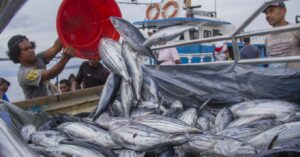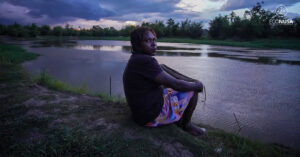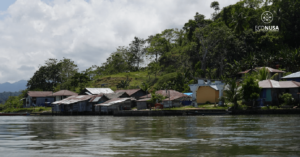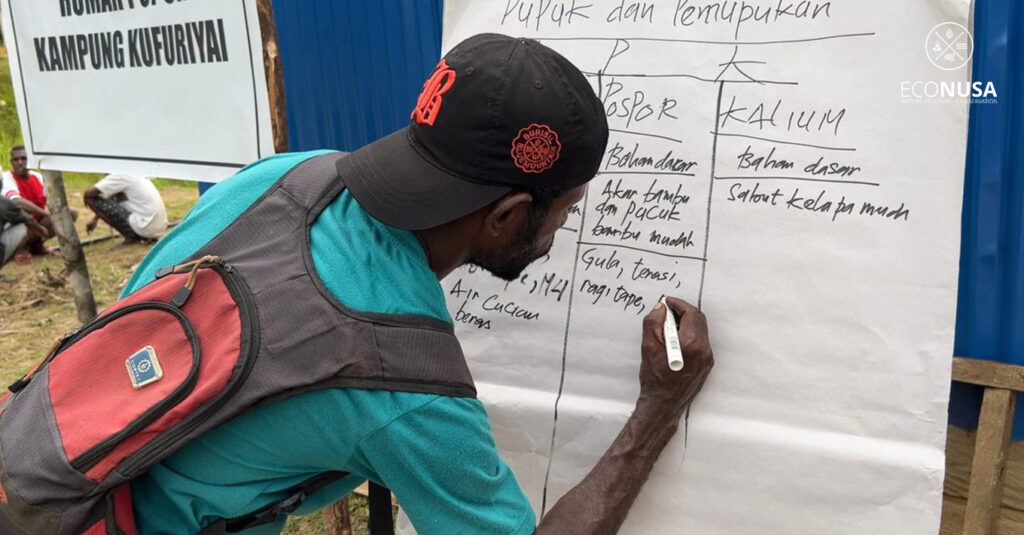
At the Kufuriyai Village hall in Arguni Bawah District, Kaimana Regency, Antonius Arfa, 32, a youngster from Iratutu tribe of Warmenu Village, stood before 35 villagers of Kufuriyai and Manggera on Thursday, 17 March 2022. On his right hand, he held a marker and wrote on white board explaining the NPK fertilizer.
NPK is fertilizer made of nutrient from Nitrogen (N), Phosphate (P), and Kalium (K). The three elements in the fertilizer here helps nurture the plant. Nitrogen eases vegetation to grow particularly the leaf. Meanwhile, the phosphate helps grow the root and bud of the plant. Kalium will grow the flowers and insemination.
The NPK fertilizer could be afforded from farming shop downtown. The impact of chemical fertilizer has big impact to plant growth and crop yield. But actually, this kind of fertilizer has adverse impact to soil function and human health.
Read also: Arguni Bawah Community Using Garden Yields for Organic Fertilizer
Communities in Arguni Bawah District often uses this sort of fertilizer for nutmeg. Thus, with his acquired knowledge, Antonius shared his learning on organic production of NPK fertilizer by utilizing the available materials in the neighborhood. In addition to its availability, organic fertilizer is also safe for human health and sustainable soil quality.
After giving brief elaboration, Antonius formed the participants into three groups to create nitrogen, phosphate, and kalium fertilizer. There were some required materials for organic fertilizer, namely green leaves, sago stem, banana stem, young bamboo, wastewater from rice washing, jerrycans, and stirring pots. After chopping, the materials were put into a bucket with sugar and coconut water solution. After equal mixing, the materials were sealed and left for seven days of fermentation process.
“The residue of green leaves will turn into compost. Meanwhile, the fermentation will produce NPK liquid fertilizer for spraying to nutmeg,” Antonius explained.
Read also: STS Participants Questioning Forest Status to South Sorong FMU
All peoples taking parts in the organic fertilizer production looked very enthusiastic. He was satisfied after sharing his knowledge to the locals. “This is part of my contribution to people in Arguni Bawah District to improve nutmeg quality. I hope the knowledge on fertilizer production could improve the quality of nutmeg particularly that of the Arguni Bawah and the soil keeps fertile,” said Antonius.
Meanwhile, on the nutmeg nursery ground, Alif Uru, a young man from Seraran Village, showed the locals on how to make grafting of nutmeg. The community looked enthusiastic upon seeing the production steps demonstrated by Alif. It started from his explanation on every tool and their use.
“If there is no cutter, kitchen knife is also applicable as long as it is thin and clean. If the knife is dirty, it will not work out well due to the bacteria,” he said. Alif asked some participants to take the mature bud of nutmeg before grafting the nutmeg tree cut in the middle. They made a cut to connect the bud of mature tree. After that, the connection is tied with white bandage and cover it with wet plastic.
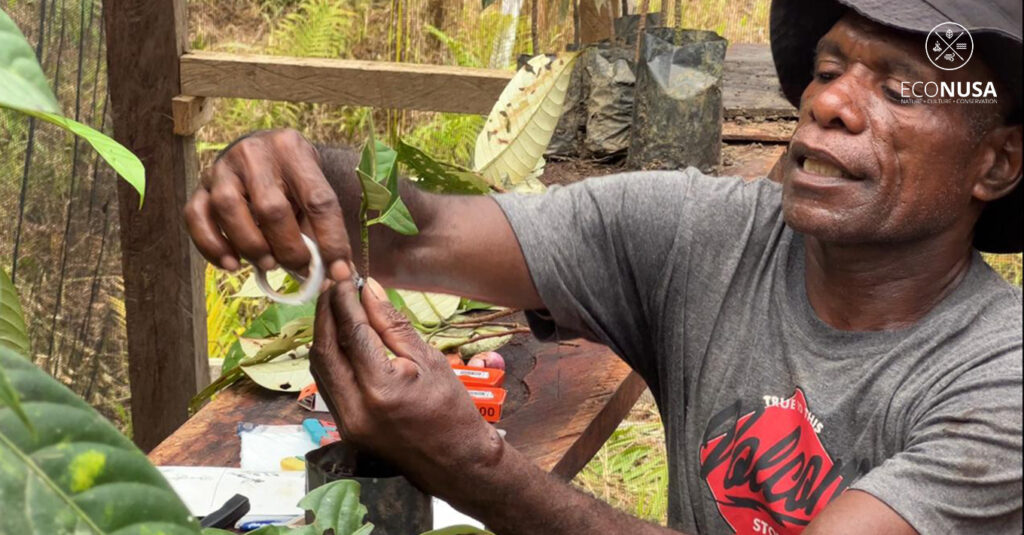
After giving twice demos of grafting, Alif then asked the villagers to do it their own. Alif was very happy when he saw some participants could practice it well. “We will see the result later. If the connection is dry, it means the grafting fails. But, never give up. Keep on trying and doing, you can make it,” he said.
Read also: Sasi Sambite: Local Wisdom to Boost Nutmeg Quality in Arguni Bawah
The application of grafting is useful to improve nutmeg production. With the knowledge on grafting method, Alif expected that nutmeg production in Arguni Bawah will increase in the near future.
In fact, both youngsters of Iratutu tribe, Antonius and Alif, were merely graduates of junior high school in Arguni Bawah District. Both acquired the knowledge from social transformation school (STS) for two months at Sisir Village.
“We are very thankful to EcoNusa Foundation for providing STS program. From the school here, I have the knowledge. This is remarkable. It is only God who can give the reward, not us. The government has so far provided the seeds and left us. They came for deceit and go without giving any instruction on how to make it. What EcoNusa gave here is what the community wanted. Thank you EcoNusa. They do not have money but they gave notable knowledge,” said Alif.
Read also: Recognition Process of Customary Land and Indigenous People in West Papua Now Shortened
Antonius also shared the similar opinion. As to him, knowledge he acquired from STS is very significant. “I joined the STS seriously for two months. I came on time and never missed any single subject because of the incredible knowledge. I want to thank to EcoNusa team and Mr. Mahmudi and his team from Insist,” said Antonius.
Editor: Leo Wahyudi & Lutfy Putra


